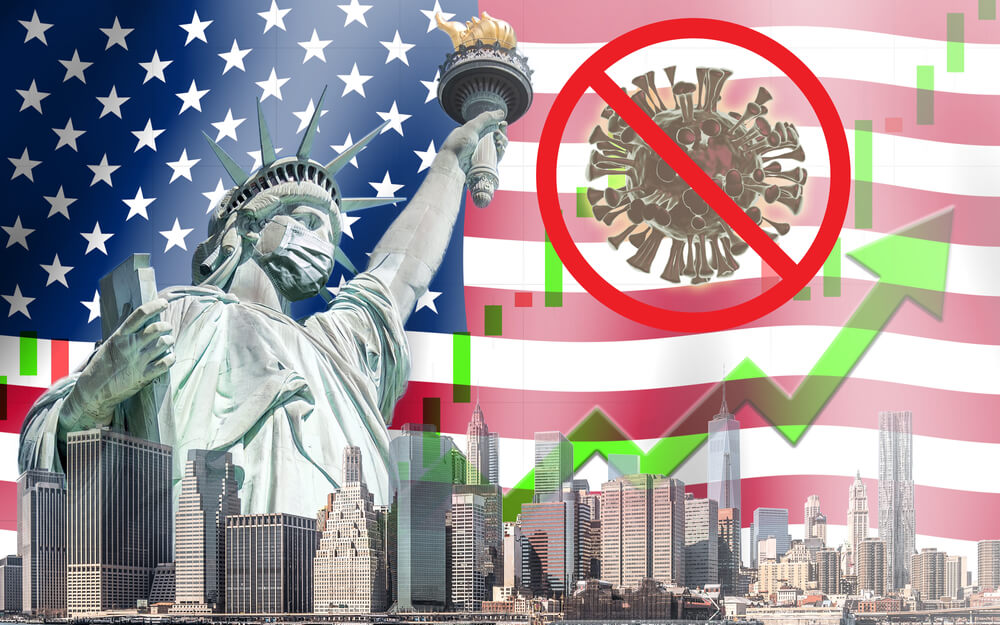Monday morning, stocks exploded higher on news that Pfizer’s vaccine was more than 90% effective in stopping COVID-19 infections.
Or I should say some stocks exploded higher. It was the stodgy old Dow Jones Industrial Average that saw the biggest gains. The tech-heavy Nasdaq barely budged.
Call it the “anti-COVID-19” trade:
- Delta Air Lines (NYSE: DAL), American Airlines Group Inc. (NYSE: AAL) and United Airlines Holdings Inc. (NYSE: UAL) all opened more than 20% higher.
- Battered entertainment REIT EPR Properties (NYSE: EPR) opened higher by over 30%.
- And movie theater chain AMC Entertainment Holdings Inc. (NYSE: AMC) — which has been flirting with bankruptcy — opened more than 50% higher.
These were the opening prices, and some of these initial gains pared back. But suffice it to say, Wall Street took the vaccine news well.
Now, there are several major takeaways here.
Vaccine Dreams: What Monday’s Stock Market Jump Tells Us
And jumps like this are often due to short covering.
There is literally no one more motivated to buy a stock than a short seller caught on the wrong side of a trade. When you short a stock, you have to borrow it first from another investor (your broker does this for you behind the scenes). You are then obligated to repurchase it — at any price.
This creates panic buying as short-sellers trip over each other to buy back the shares they sold. As the old Wall Street maxim goes, “He who sells what isn’t his’n, buys it back or goes to prison.”
So, moves like this are often more a result of panic than genuine elation.
Secondly, assuming all goes well and the vaccine is as good as advertised, it will still be months until it is deployed to the general population. And even then, its success depends on people actually taking it. Even a 50% acceptance rate might be enough to break the pandemic. But that won’t happen tomorrow, and we’re still in the midst of a nasty second wave of infections.
The markets are forward-looking. Stock prices represent assumptions about future earnings, not current earnings. But it’s important to remember that the picture is really murky here, and forecasting future earnings would be hard even under normal conditions.
We should also stop to consider how many of the changes in the past six months are likely to be permanent.
The Lasting Effects of COVID-19 on the Markets
I know I’ll travel again. I may be getting on a plane as soon as next week.
But will I consume less content over streaming services? Will I do fewer calls over Zoom or order fewer packages on Amazon.com?
Probably not. I was already doing these things pre-pandemic, and the experience of the past six months has only reinforced these habits.
That means I probably wouldn’t go dumpster diving in department store or restaurant stocks just yet. Many of these companies were struggling long before the pandemic hit, so a vaccine isn’t going to make their problems instantly disappear.
But there may be opportunities to swing trade. If you can scalp a few percent trading an airline stock or two, who am I to tell you no?
Just remember that the trends dominating the market were mostly in place before the pandemic hit. And the biggest growth names a year ago are still the biggest growth names today.
Third-quarter GDP numbers came in strongly; the best in history, in fact. But it’s important to remember that even after the impressive recovery of the past several months, our economy is roughly where it was at the bottom of the 2008 meltdown and subsequent recession in terms of economic contraction.
We still have a long way to go until the U.S. economy is back to pre-coronavirus levels. And the economy we rebuild will look a little different from the one that got obliterated by COVID-19.
So, you may not want to dump those tech stocks just yet.
Money & Markets contributor Charles Sizemore specializes in income and retirement topics. Charles is a regular on The Bull & The Bear podcast. He is also a frequent guest on CNBC, Bloomberg and Fox Business.
Follow Charles on Twitter @CharlesSizemore.
